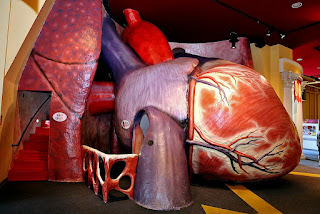So I just thought of a new poetic form. In honor of today, I call it the "Four-Twenty." It's simply four lines that total twenty syllables. How many syllables are in each line is entirely up to you...man. The subject matter can be anything, although something appropriate to the day (a reference to mind-altering substances, some psychedelic imagery, etc.) would be cool.
Here's my example:
"Dispensary"? Wow.
We've come a long way
from Panama Red
in a nickel bag.
(For the record, I haven't partaken in many years - I'm just getting into the spirit of the day.)
Today's prompts:
WBP: Write a poem using at least three of the following words - bear, collar, flair, hear, praise, ramble.
NPWM: Write a poem that recounts a historical event.
PSH: "The Prompt: Birds and Bees Are Better Than Us
The Form: Write three (3) haiku using this prompt."
I combined prompts one and three to create these haiku. Each one contains two words from the word bank:
praise the grizzly bear
with no tackle he swipes
salmon with one paw
collarless cat
rambles through our neighborhood
on no one's schedule
radar-eared deer
have a flair for vigilance
and hear what we don't
For the "history" prompt, I'll tell a story I may have told before in poetic form. It's rather narrative (as have been a number of my poems this month - some of the prompts tend to lead one in that direction.)
Spirit of Glassboro
I was sixteen, at a competition
in Virginia
with my high school band, when we
got the call:
Come back to New Jersey—Johnson
and Kosygin
are having a summit in Glassboro,
our home town.
We arrived the next day.
It was June of ‘67. The Six-Days
War in the Mideast
was just winding down. We hustled
off our buses,
all starched up in our uniforms, and
got in formation
just in time to play from the
parking lot
for the dignitaries rolling by in
their black limousines.
My bandmate said he thought he
saw Kosygin wave.
The President and the Russian Premier
met
at Hollybush, the historic home
of the college president
on the state college campus, for
three days,
talking about Vietnam, the Mideast,
weapons systems, and who knows
what.
They came out to address us, the
people crowded
on the grounds, while news
cameras and reporters
swarmed everywhere. We gave the two leaders
a warm reception, reflecting well on us folks
from the “sleepy little college
town,”
as the press liked to describe
us.
In the end, not much was really
accomplished,
but the Cold War may have thawed just a little.
And no matter what it meant to the
annals of history,
it meant something to me that I
was there.

